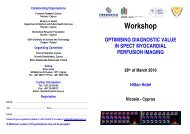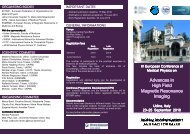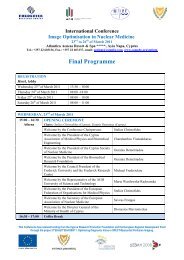medical physics international - Cyprus Association of Medical ...
medical physics international - Cyprus Association of Medical ...
medical physics international - Cyprus Association of Medical ...
- No tags were found...
Create successful ePaper yourself
Turn your PDF publications into a flip-book with our unique Google optimized e-Paper software.
MEDICAL PHYSICS INTERNATIONAL Journal, vol.1, No.1, 2013otherwise would be difficult to organise as a separateactivity).Due to the variety <strong>of</strong> University undergraduateprogrammes, it is not possible to advice on specific entryrequirements. Selecting students with an interview is alwaysadvisable, as this way the selecting panel could agree on theacceptable entry level, type <strong>of</strong> questions, etc.STUDENTS’ ASSESSMENTAs usual standard written exams (2 to 3 hours examwriting time) are required for passing the educationalmodules. The percentage which the exam mark takes fromthe overall module mark is advisable to vary between 60and 80%. This way the remaining 40-20% are for coursework to assess the progressive build-up <strong>of</strong> <strong>Medical</strong> Physicsknowledge (coursework in a form <strong>of</strong> essay on a subject,small design project, a set <strong>of</strong> tasks, etc given and assessedduring the semester). The dynamics <strong>of</strong> our pr<strong>of</strong>ession andthe structure <strong>of</strong> knowledge does not allow for missingcoursework (or any other type <strong>of</strong> home work). This workshould be structured to be answerable in approx. 8 hours (byan average student). The course work has to be assessed andfeedback given to the students before the exam.Due to the relative difficulty <strong>of</strong> the <strong>Medical</strong> Physicsexams, it is advisable for these to be distributed in two examsessions (after each substantial term). At least 3 daysrevision time should be given in-between exams. In case <strong>of</strong>modular delivery the exam could follow directly the end <strong>of</strong>the module. It is a good practice for the exam questions tobe confidentially agreed not only by the respective lecturers,but also by an External Examiner, who is from anotherUniversity (or at least is not involved in the coursedelivery).The pass mark <strong>of</strong> each module is to be decided by theUniversity, but it should not be below 40% (assuming 100%is the maximum mark) for each element <strong>of</strong> the assessment -written exam and course work. Many Universities requirefor the minimal sum pass mark to be 50% and the writtenexam to be assessed by two examiners.Assessment <strong>of</strong> the MSc thesis (or Diploma work)includes normally an oral exam (viva voce), where thestudent has to defend his/her project/hypothesis and answersthe questions <strong>of</strong> the examiners. The number <strong>of</strong> examiners inthe panel can vary according to local requirement. Normallythe pass mark for MSc thesis is 50%. This mark shouldinclude approx 70-80% from the theses assessment and 30-20% from the actual oral exam presentation. A goodpractice can be introducing an Interim MSc exam (approx. 1month after the beginning <strong>of</strong> the MSc research work), wherethe student presents his/her idea, initial literature search,expected results and working plan. This Interim exam canbe assessed with 10% from the total MSc thesis mark, butcould give an early feedback to the student for thedevelopment <strong>of</strong> his/her re-search and could prepare him forthe final oral examination.SUGGESTION FOR THE MODULES OF THEPROGRAMMEThe syllabi <strong>of</strong> modules <strong>of</strong> the Model Curriculum includethe main components necessary for initiating practice in thepr<strong>of</strong>ession. However due to the dynamic development andexpansion <strong>of</strong> the pr<strong>of</strong>ession these have to be regularlyupdated. The Model Curriculum is based on a number <strong>of</strong>publications, collected over the last 15 years at specialConferences, Workshops and Seminars [1-8].Based on these an indicative suggestion for the mainmodules in a MSc-level programme in <strong>Medical</strong> Physics(plus their % <strong>of</strong> contact hours) can be presented as:Basic modules:Basis <strong>of</strong> Human Physiology and Anatomy ~10%Basis <strong>of</strong> Radiation Physics ~10%Research Methods ~10%Radiation Protection and Hospital Safety ~10%Topical modules:<strong>Medical</strong> Imaging Physics and Equipment 1 ~10%(non-ionizing radiation - MRI, Ultrasound)<strong>Medical</strong> Imaging Physics and Equipment 2 ~10%(ionizing radiation – X-ray, Nuclear Medicine)Radiotherapy Physics and Equipment ~15%Other optional modules could also be included.MSc project work ~ 25%INDICATIVE OUTLINE OF THE SYLLABI OF THEBasic modulesMODULESBasis <strong>of</strong> Human Physiology and Anatomy ~10%This module aim is to give to students background fortheir further studies and to help them in their future workwith <strong>medical</strong> colleagues. From this point <strong>of</strong> view it isadvisable for this module to be placed at the beginning <strong>of</strong>the teaching programme. It could have internal structurebased on sub-modules (approx. 2 to 4 hours each),according to the main systems in the body (with emphasison physiology). In principle it can be delivered as 5 to 818






